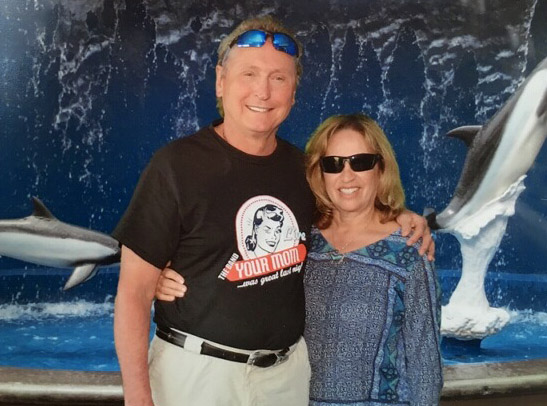Mesothelioma Survivor: ‘My Glass Is Always Half Full’

Fact Checked | Written by: Tim Povtak | Last Update: 10/25/2024 | 6 Min Read
Peritoneal mesothelioma survivor F.X. Dickert doesn’t have time to die. His schedule is already full.
Dickert, 66, will undergo aggressive surgery in October for the third time in the last two years, and he’s approaching it with the same energy and optimism he had for the previous two operations.
“I’m already supposed to be dead, according to the doctors who I saw first, but I’ve still got a long list of things to do yet,” he said. “I’ve got people to see, places to go. My glass is always half full. That’s not going to stop now.”
Dickert, who lives near Madison, Wisconsin, will soon undergo another cytoreduction and a second round of hyperthermic intraperitoneal chemotherapy (HIPEC), expecting to stop the latest tumor growth and lead to another quick recovery.
Then the fun will resume.
“I plan to sell the house and buy a big fancy RV to travel the country with my canoe and my girlfriend. I want to do the Alaska Highway (which is 1,387 miles in length) in the summer, go south in the winter,” he said. “I’m also thinking of going to Greenland, Russia, Latvia and doing a Copenhagen cruise. We’ll have a good time.”
Immunotherapy Clinical Trial in Chicago
Somewhere along the way, Dickert will enroll in an immunotherapy clinical trial with mesothelioma specialist Dr. Hedy Kindler at the University of Chicago Medical Center — schedule permitting, of course.
There is also a safari in South Africa on his to-do list and another fly-in canoe trip to northwest Ontario, where in past years he has come face to face with black bears, caribou, moose and golden eagles.
“My original plan was to get past my dad’s death age [of 83], but whether I can accomplish that now is another thing,” he said. “You’ve got to have lofty goals. I’m hoping that as time goes by, they will be getting better, more effective medicines. I’m hearing good things about this clinical trial and how much it has helped people lately.”
He forgot to mention the road trip he already scheduled with three other couples for the Nebraska-Wisconsin college football game Oct. 7 in Lincoln, Nebraska or the fishing trip on the Salmon River in Ontario with two of his sons.
Yes, he plans to stay busy.
“Once he gets back on the right track, you could have a pretty good success story,” said his girlfriend, Leslie Merar-McCloud. “Mesothelioma has him down a little bit now, but he won’t give in, and he won’t give up. He’ll be back.”

Learn how to access mesothelioma clinical trials utilizing immunotherapy.
Sign Up NowFortune and Mental Toughness Helped His Journey
Dickert is fortunate to have the financial resources that allow him to still enjoy the adventurous lifestyle he loves. He rarely sits still. His pace may have slowed, but his desire has not.
He and Merar-McCloud credit his survival to mental toughness. This summer was exhausting as he recovered from an intense radiation regimen and internal hemorrhaging, which prevented him from enrolling in the clinical trial. Yet he continues to persevere.
“My strength and energy level are down right now, but those will come around. It just won’t be overnight,” he said. “I plan ahead for what I want to accomplish each day. That helps a lot. Set a goal to do something physical each day. Mulch the beds, trim the shrubs, something. If you don’t expect to do something, then you’ll accomplish nothing.”
Dickert still owns and helps manage a successful industrial paint contracting business that has been in the family for three generations. It employs more than 450 people.
“I’ve been very, very fortunate in a lot of ways throughout my life,” he said. “My sister is a nurse who has helped me through this ordeal. My girlfriend has been great, my grown children, too. This has been the biggest challenge in my life, but I’m going to get through it.”
Dickert was diagnosed in July 2015 when he returned from a trip to Canada, first thinking it was only a painful hernia from carrying his canoe for too many hours.
He had been taking trips to the Canadian outdoors his entire adult life. This summer was the first time in 40 years he didn’t make it.
After considerable testing, doctors eventually diagnosed him with peritoneal mesothelioma, which was spreading throughout his abdominal cavity.
He believes it was caused by asbestos exposure on a job site in the mid-1970s.
“The original doctor told me I had three to six months to live, maybe nine months if I was lucky and the chemotherapy worked. He said, ‘You’re toast. Go spend time with your family. There is really nothing else you can do,’” Dickert remembers. “I couldn’t believe it. I just told him, ‘I’m not toast yet.’”
Importance of Second Opinions
With wonderful support from friends and family, and the money to do it, Dickert traveled to find mesothelioma specialists around the country, getting second, third and fourth opinions. He wanted to know everything.
He settled on Dr. Kiran Turaga, a peritoneal specialist, for the first two surgeries. Turaga works with Kindler, whose own father died of mesothelioma.
“I’m lucky because I could afford to do this, but a lot of people can’t. It’s a good example, though, of why you need to look around and get other opinions,” he said. “Be your own advocate. A lot of people just think their one doctor is like a god and the final word. But that’s just not the case. I kept looking until I found the best.”
The first and second surgeries did not stop him. He and Merar-McCloud traveled extensively in 2016 after his speedy recovery, visiting Hawaii, Australia, New Zealand and New Mexico.
Sitting still has never been an option. When he sells his home near Madison, he will be moving his base to central Wisconsin, where he already keeps a 300-acre ranch bordered by two lakes and filled with wildlife. There is considerable work to do there.
“I’m not going anywhere anytime soon,” he said. “Anytime you start to feel down about everything, you have to go to what makes you happy. And for me, that’s keeping busy.”





